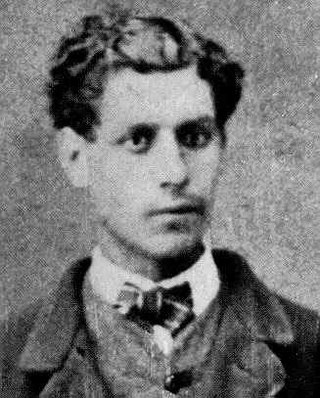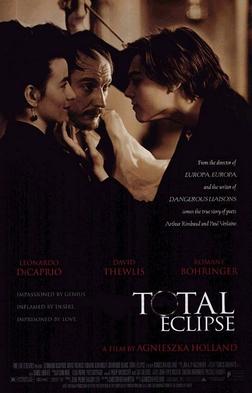
Comte de Lautréamont was the nom de plume of Isidore Lucien Ducasse, a French poet born in Uruguay. His only works, Les Chants de Maldoror and Poésies, had a major influence on modern arts and literature, particularly on the Surrealists and the Situationists. Ducasse died at the age of 24.

Jean Nicolas Arthur Rimbaud was a French poet known for his transgressive and surreal themes and for his influence on modern literature and arts, prefiguring surrealism.

Paul-Marie Verlaine was a French poet associated with the Symbolist movement and the Decadent movement. He is considered one of the greatest representatives of the fin de siècle in international and French poetry.

François Edouard Joachim Coppée was a French poet and novelist.

Robert Desnos was a French poet who played a key role in the Surrealist movement.

Total Eclipse is a 1995 erotic historical drama film directed by Agnieszka Holland, based on a 1967 play by Christopher Hampton, who also wrote the screenplay. Based on letters and poems, it presents a historically accurate account of the relationship between 19th-century French poets Arthur Rimbaud and Paul Verlaine. Warner Bros. has included the film in the catalogue of Warner Archive Collection.
Illuminations is an incomplete suite of prose poems by the French poet Arthur Rimbaud, first published partially in La Vogue, a Paris literary review, in May–June 1886. The texts were reprinted in book form in October 1886 by Les publications de La Vogue under the title Les Illuminations proposed by the poet Paul Verlaine, Rimbaud's former lover. In his preface, Verlaine explained that the title was based on the English word illuminations, in the sense of coloured plates, and a sub-title that Rimbaud had already given the work. Verlaine dated its composition between 1873 and 1875.

Georges Alphonse Fleury Izambard was a French school teacher, best known as the teacher and benefactor of poet Arthur Rimbaud. He taught at the Collège de Charleville in Charleville, where his nickname was "Zanzibar".

A poète maudit is a poet living a life outside or against society. Insanity, crime, violence, abuse of alcohol or other drugs, and in general any societal sin, often resulting in an early death, are typical elements of the biography of a poète maudit.
Le Bateau ivre is a 100-line verse-poem written in 1871 by Arthur Rimbaud. The poem describes the drifting and sinking of a boat lost at sea in a fragmented first-person narrative saturated with vivid imagery and symbolism. It is considered a masterpiece of French Symbolism.

The Album de la Pléiade is a book published every year in May by the "Bibliothèque de la Pléiade", a series of classic French and international texts by French publishing house éditions Gallimard. It is usually about an author published in the series, although occasionally about a collective from a specific time period or an important topic of the collection.
Pascal Lainé is a French academic, novelist, and writer.

A Season in Hell is an extended poem in prose written and published in 1873 by French writer Arthur Rimbaud. It is the only work that was published by Rimbaud himself. The book had a considerable influence on later artists and poets, including the Surrealists.
René Marie Galand was a writer and Professor of French. He was born in Châteauneuf-du-Faou in Brittany.
Jean-Pierre Desthuilliers was a French writer and poet. He was born on 22 October 1939 in Versailles and died on 6 December 2013.
Nicolas Bataille was a French actor and director.

A Season in Hell is a 1971 French-Italian drama film directed by Nelo Risi. The film tells the life and death of the poet Arthur Rimbaud and his troubled relationship with the poet Paul Verlaine until the African adventure in Ethiopia.

Ernest Delahaye (1853–1930) was a French writer and essayist. He maintained a long and close friendship with Arthur Rimbaud whom he first met in April 1865 when they attended school together in Charleville in the Ardennes region of France. He and Rimbaud had a shared interest in poetry, and he would help Rimbaud by making fair copies of his drafts for distribution to Rimbaud's literary friends. He was one of the few (seven) recipients of the privately printed A Season in Hell, though Rimbaud later asked for it back to give it to someone else. According to Rimbaud biographer, Charles Nicholl, Rimbaud's "[last] strictly dateable poem" was contained in a letter to Delahaye of 14 October 1875. Through Rimbaud, Delahaye also met poet Paul Verlaine and became friendly with him. Verlaine wrote a poem - Sonnet Boiteux - which is dedicated to him. Delahaye mixed his civil service career, working at the Education Ministry, with writing biographical material on both Rimbaud and Verlaine, contributing first-hand accounts of the poets' lives and families.
Paterne Berrichon, the pseudonym of Pierre-Eugène Dufour was a French poet, painter, sculptor and designer. He is best known as husband of Isabelle Rimbaud, and the brother-in-law and publisher of Arthur Rimbaud.

"Voyelles" or "Vowels" is a sonnet in alexandrines by Arthur Rimbaud, written in 1871 but first published in 1883. Its theme is the different characters of the vowels, which it associates with those of colours. It has become one of the most studied poems in the French language, provoking very diverse interpretations.













